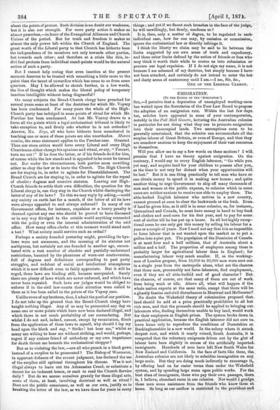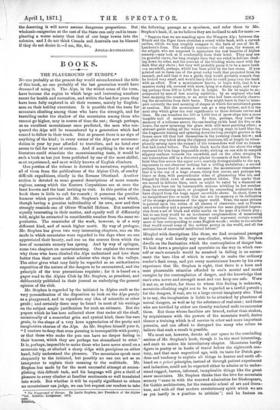EMIGRATION.
[TO THE EDITOR OF THE "SPEOTATOR.1
SIR,—I perceive that a deputation of unemployed working-mem has waited upon the Secretaries of the Poor Law Board to propose.
theadoption of an emigration rate. Within the last few days..
too, articles have appeared in some of your contemporaries, notably in the Pall Mall Gazette, lecturing the Australian colonies.
in particular for not doing what they can to promote emigration. into their unoccupied lands. Two assumptions seem to be. generally entertained, that the colonies can accommodate all the surplus labour of Great Britain, or even of Europe, and that they are somehow anxious to keep the enjoyment of their vast resources-. to themselves.
Will you allow me to say a few words on these matters ? I will. premise that I have no theory against emigration. On the.
contrary, I would say to every English labourer, "Go while you..
yet may, and acquire land for your children to possess after you,. as the time is not very far distant when your opportunities will..
be lost." But it is one thing practically to tell men who have on can obtain money to spend it in making new homes ; and quite. another thing to urge Government to ship off many thousands of , men and women at the public expense, to colonies which in some_ cases are neither anxious to receive nor able to employ them. The. able-bodied English labourer who arrives in a new country, cannot proceed at once to clear the backwoods or the bush. Even,— if land be given him, as it still is in some colonies, as, for instance„. Queensland and Canada, he must have money in hand to buy food.
and clothes and seed-corn for his first year, and to pay for some.. sort of shelter till he has put up a house. In all but highly excep- tional cases he can only get this money by selling his labour for a year or a couple of years. Now I need not say that it is as impossible.. toforce labour that is not wanted upon the market as to put a.
gallon into a pint pot. The popuktion of the Dominion of Canada. is at most four and a half millions, that of Australia about a. million and a half. The proportion of employers among these is. probably larger for agricultural labour than in England ; for manufacturing labour very much smaller. If, as the working- men of London propose, from 10,000 to 20,000 men were sent out.
in a single year from the metropolis alone, what are the chances_ that these men, presumably not farm-labourers, find employment,. even if they are all able-bodied and of good character ? But_ the chances, of course, are that many of them are out of work from being weak or idle. Above all, what will happen if the. whole nation exports at the same ratio, except that there will be..
a ghastly famine and civil disturbances in Montreal and Melbourne?. No doubt the Wakefield theory of colonization proposed that.. land should be sold at a price practically prohibitive to all but rich men, and that the proceeds should be applied to bringing out- labourers who, finding themselves unable to buy land, would work for their employers at English prices. The system broke down in practical application, because the English labourer did not care to leave home only to reproduce the conditions of Dorsetshire or Buckinghamshire in a new world. In the colony where it struck deepest root, and which it nearly ruined, South Australia, it ia computed that the voluntary. emigrants driven out by the glut of labour have been slightly in excess of the artificially imported.
immigrants. Hundreds of men have left New South Wales for.
New Zealand and California. In the face of facts like these, the. Australian colonies are not likely to subsidize immigration on any large scale. But they are doing much indirectly to encourage it„ by offering land on far easier terms than under the Wakefield. system, and by spending large sums upon public works. For the best class of immigrants, those who pay their own passages, there. is, I believe, abundant room in our colonies. Nor would I grudge these men some assistance from the friends who know them at home. So long as our outflow is restricted to the provident and. the deserving it will never assume dangerous proportions. But wholesale emigration at the cost of the State can only end in trans- planting a worse misery than that of our large towns into the colonies, and I do not think Canada and Australia can be blamed if they do not desire it.—I am, Sir, &c.,
ANGLO-AUSTRALIAN.

































 Previous page
Previous page